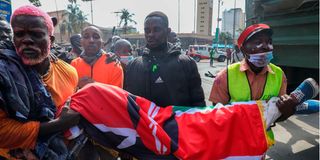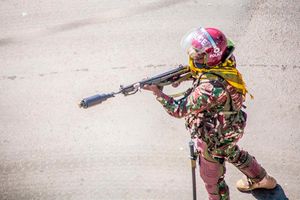
Demonstrators carry the body of a protester who was shot dead at Parliament Buildings during the anti-Tax Bill protests in Nairobi on June 25, 2024.
The High Court has ruled that incidences of death and injuries arising from police action or happening in police custody should be exclusively investigated by the Independent Policing Oversight Authority (Ipoa).
In a boost to IPOA, High Court judge Lawrence Mugambi said no other investigate body, including Internal Affairs Unit (IAU), an independent unit within the National Police Service (NPS), should probe cases where a police officer on duty or occurring in a police station.
“A declaration is hereby issued that the investigation into all incidents of death and serious injury that are a result of police action caused by a member of police on duty or that which happens while in police custody is an exclusive mandate of the Independent Policing Oversight Authority and not any other investigatory body including the Internal Affairs Unit (IAU) or any other body under the National Police service,” said the judge.
Lobby groups including Kituo Cha Sheria and Haki Africa stated that there have been cases of interference and in some instances, obstructing of investigations, when IPOA and IAU conduct parallel investigations.
The court also directed the NPS and the Director of Public Prosecutions (DPP) Renson Ingonga to provide data on official number of complaints of extrajudicial killings and enforced disappearances received from 2010 to date, and the number of prosecutions particularly officers that have been disciplined and criminally prosecuted.
The report should be furnished within 90 days from the date of judgment.
While agreeing with the petitioners on the rising cases of extra-judicial killings and enforced disappearances, the court directed NPS to open and maintain and dedicate a register of all cases of enforced disappearance and extrajudicial killings.
Scores of youths were killed and others are still missing, following demonstrations against tax laws last year.
Justice Mugambi, however, rejected a prayer to refer cases of enforced disappearances and extra-judicial killings to International Criminal Court (ICC) for investigations and prosecution, saying the cases have not reached the threshold for referral.
The Judge said referral to ICC can only happen when it was clear that the investigative agencies and the courts in the country have failed to act.
Justice Mugambi said there was no actionable evidence to compel the court to refer such cases to ICC.
The lobby groups pointed out that due to the high number of cases of enforced disappearances and the low number of investigations and prosecutions, the government was unwilling or unable to genuinely carry out the investigation or prosecution.
Kituo Cha Sheria through Dr John Khaminwa and John Mwariri said more cases of extra-judicial killings and enforced disappearance continue to be reported, but the government was doing very little to contain situation.
Dr Khaminwa said the police and military continue to be implicated in the disappearances and killings of individuals, yet the government kept denying responsibility for the abuses.
The veteran lawyer said in most instances the National Police Service have taken the role of investigating crimes committed by the police themselves, a fact that has highly compromised the partiality of investigators of the police and which by itself is a conflict of interest.
According to Kituo Cha Sheria, the police are responsible for investigation of crimes. On the other hand, IPOA is responsible for investigation of crimes committed by the police. As such there exists an overlap of mandate between the Directorate of Criminal Investigations (DCI) and IPOA on investigating extrajudicial killings and enforced disappearances.
Justice Mugambi said IPOA’s role is to hold the police accountable, promote professionalism and ensure that the officers perform their work professionally.






